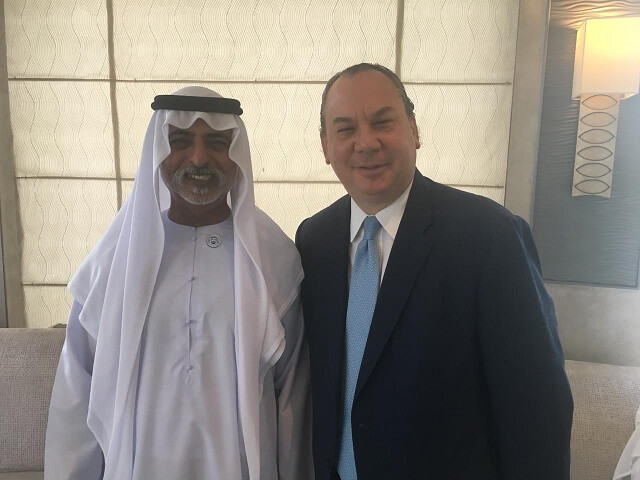
Arabian Gazette
By Mahsoom Thottathil
January 30, 2019

Rabbi Marc Schneier with Sheikh Nahyan, UAE Minister of Tolerance.
Interview with Rabbi Marc Schneier, a visionary in building interfaith relations of key ethnic groups and communities
Rabbi Schneier is a champion in building interfaith relations, especially Muslim-Jewish relations. Rabbi Schneier is here in the United Arab Emirates (UAE) to represent the Jewish communities in the Gulf, as part of the historic Pope Francis visit to the country.
Rabbi Schneier is the President of the Foundation for Ethnic Understanding, the global address for Muslim-Jewish relations and the national address for African American-Jewish relations. When he established the organization 30 years ago, it was with the commitment to the belief that direct dialogue between ethnic communities is the most effective path towards reconciliation.
Rabbi Schneier is also the Founding Rabbi of The Hampton Synagogue located in Westhampton Beach, New York. The Hamptons used to be known as a party scene in the summer, devoid of faith and religion. The Rabbi who always has been a builder, 29 years ago, set out to build a Jewish community in the Hamptons. Today, it is the preeminent and most dynamic community in the Jewish world. It has hosted U.S. Presidents, presidential candidates, cabinet secretaries, politicians, 40 UN Ambassadors, interfaith leaders including Muslim leaders.
Bringing together these two aspects of his life, he’s been asked by leaders in the Gulf to help build Jewish life here. It brings together his expertise in Muslim-Jewish relations through his work at the Foundation and him being a builder and what he has built in the Hamptons. Now, he’s working to do this in the Gulf.
Here are the excerpts of the interview:
Your thoughts on the United Arab Emirates declaring 2019 as the ‘Year of Tolerance’?
I think it is wonderful that the United Arab Emirates is declaring 2019 as the “Year of Tolerance.” It is very exciting to see and hear about the planned activities and initiatives that will all align with the goal of furthering peaceful co-existence. To start, it is historic that Pope Francis is visiting Abu Dhabi and a true honor for me to be here for this and to represent the Jewish communities in the Gulf. This is not only an incredible fete for the UAE and the Vatican, but it marks a new era for interfaith relations.
This weekend celebrates the publication of a new book coming out, “Celebrating Tolerance: Religious diversity in the UAE,” which will list all of the religions in the UAE and I’m very proud to share that for the first time, the Jewish community in Dubai will be featured which is an affirmation of the community. My dear friend Minister of Tolerance Sheikh Nahyan bin Mubarak Al Nahyan wrote the introduction to the foreword of the book.
Your thoughts on the United Arab Emirates embracing multi-cultural and multi-religious faith? Do you think the UAE model can be a role model in this case?
It is wonderful to see the list of wonderful programming and initiatives planned for this year and this is an example of yet another Gulf country that has dedicated and committed itself to the ideals of tolerance, mutual understanding, and co-existence.
What is the magic recipe for achieving world peace?
The magic recipe for achieving world peace is adopting the very principle that the Foundation for Ethnic Understanding was created upon and that is people fighting for the other. As I often share, when a people fight for their own rights, they are only as honorable as when they fight for the rights of all people and the need in our world to develop an empathetic imagination to recognize the hopes, hungers, feelings and fears of others and to recognize that all people – as the children of God – are entitled to be treated with the dignity, justice, and compassion that we claim for ourselves. If we have this in mind, we will achieve world peace and make the world a better place.
What is an ideal solution for the Israel-Palestine conflict?
I believe that the Gulf states play a critical role in resolving this conflict. The Gulf states can bring a much-needed economic dimension and financial hope to the Palestinians. Additionally, the Gulf is now seen as a paradigm of interreligious dialogue and so with their support, both parties will be open to coming to the table and finding a suitable solution.
You are at the forefront of improving Jewish-Muslim relations throughout the world. Please tell us your viewpoints on how Jews and Muslims have more that unites them than what divides them?
I often refer to Islam and Judaism as a common faith and a common fate, and how it is our single destiny, particularly between Muslims and Jews, to strengthen our bonds of concern and compassion and see each other as children of God, entitled to the dignity, justice, and compassion that we claim for ourselves. We saw an outpouring of solidarity and compassion after the massacre of 11 worshippers at the synagogue in Pittsburgh in October 2018. The American Muslim community in Pittsburgh raised $200,000 to pay for the burials of those Jewish victims. So, in the U.S., from a bridge-building, coexistence perspective, we are living in some remarkable times. We know that at the end of the day, the bigots, the white supremacists, are not going to discriminate between Muslims, Jews, African Americans, Latinos. It’s open season for them on “non-whites” or other faith communities, and so we need to bond together. And this is a challenge not only in the U.S. – it’s becoming a global challenge. We have too many enemies that are looking to see us eradicated.
On a personal note, I was very touched that right after the Sabbath of the Pittsburgh massacre, the first call I received was from Sheikh Nahyan who called to express his condolences and deepest sympathy to me and to the greater Jewish community.
Can you please tell us more about your books “Sons of Abraham: A Candid Conversation about the Issues That Divide and Unite Jews and Muslims” and “Shared Dreams: Martin Luther King, Jr. and the Jewish Community”?
I wrote “Sons of Abraham: A Candid Conversation about the Issues That Divide and Unite Jews and Muslims” with Imam Shamsi Ali who is the head Imam of New York. In the book, we tell the story of how we became friends and offer a candid look at the contentious theological and political issues that frequently divide Jews and Muslims, clarifying erroneous ideas that extremists in each religion use to justify harmful behavior. I speak about dispelling misconceptions about chosenness in Judaism, while Imam Ali explains the truth behind concepts like jihad and Shari’a. And, on the Israeli-Palestinian conflict, we speak forthrightly on the importance of having a civil discussion and the urgency of reaching a peaceful solution.
Through the book, we show that by reaching a fuller understanding of one another’s faith traditions, Jews and Muslims can realize that they are actually more united than divided in their core beliefs. Both traditions promote kindness, service, and responsibility for the less fortunate—and both religions call on their members to extend compassion to those outside the faith. We challenge Jews and Muslims to step out of their comfort zones, find common ground in their shared Abrahamic traditions, and stand together and fight for a better world for all.
The foreword to the book was written by President Bill Clinton and it was published by Random House / Beacon Press. It is the only book to ever be written by a Rabbi and an Imam. Together, Imam Ali and I have brought the message of the book to the world – across the United States and Europe, the Gulf, Israel, Indonesia, Singapore and Azerbaijan.
I wrote “Shared Dreams: Martin Luther King, Jr. and the Jewish Community” with Martin Luther King III. In the book, we talk about the historic alliance between Blacks and Jews that brought about many of the greatest social and political changes in the history of the United States. We shed light on the commitment and the relationship between the Jewish and black communities in America as they struggled together to fight for justice and civil rights.
…and your award-winning film, Jinn, written by African-American Muslim director, Nijla Mu’mim?
“Jinn” explores the themes of identity, religion and coming of age as it tells the story of Summer, a 17-year old black girl, whose world is turned upside down when her mother, a popular meteorologist named Jade, abruptly converts to Islam and becomes a different person, prompting Summer to reevaluate her identity. While Summer initially resists Islam, she eventually becomes drawn to its teachings, particularly around the “Jinn,” supernatural beings who occupy a parallel world and have free will, like humans. Summer soon realizes that religion is more complex than she thought, and that people interpret it in different ways. Yet, Summer’s need to be free and untethered to any one way of being clashes with her mother’s strict interpretation of the faith and causes a growing rift between them.
The film underscores both my and the Foundation’s mission of fighting against Islamophobia and anti-Muslim bigotry and our desire to share messages of tolerance and dialogue.
The film is one of only a few full-length feature films dealing with what it is like to grow up Muslim in the United States. It is one of the few films to address Islamophobia and anti-Muslim bigotry in the U.S. It is meant to expose the American audience to the wonderful traditions of Islam.
I think what makes most people take a step back is when they hear about the movie is that it was a Rabbi who produced it. It has been playing in theaters all across the U.S. as well as at the prestigious SXSW where it won many awards.
Anything else you’d like to share with us?
As the Gulf moves in this direction, you will see more and more members of the Jewish faith visiting the Gulf. There are many opportunities for both commerce and tourism which will benefit from this. As we strengthen the Jewish communities in the Gulf and are able to provide the necessary amenities for Jewish life here, we will see the Gulf become a larger destination for global Jewry.
We are living in remarkable times and the opportunities are endless.
Copyright © 2025 Foundation For Ethnic Understanding. All rights reserved. | Privacy Policy